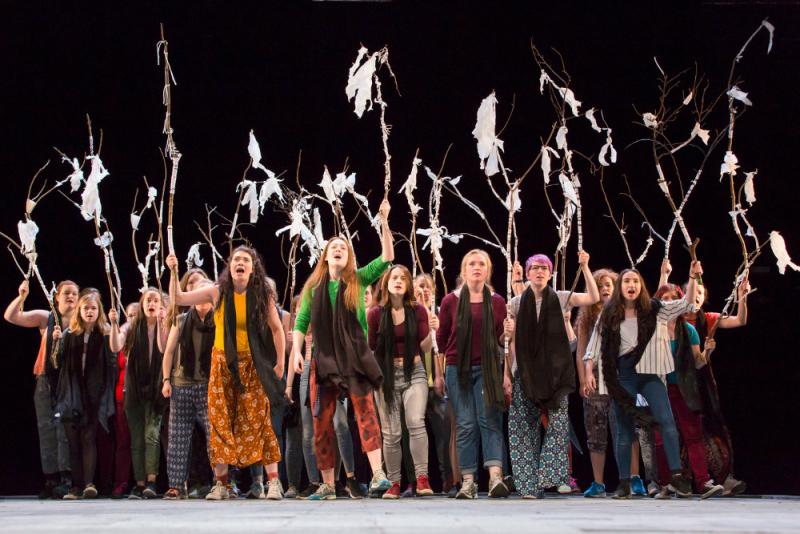The Suppliant Women, Royal Lyceum Theatre, Edinburgh | reviews, news & interviews
The Suppliant Women, Royal Lyceum Theatre, Edinburgh
The Suppliant Women, Royal Lyceum Theatre, Edinburgh
Flawed but fascinating Aeschylus adaptation from David Greig

Fleeing rape and forced marriage in their war-torn homeland, a boatload of women refugees washes up in Greece, where they beg asylum from the suspicious locals. No, not a depressingly familiar news story of our own times, but the basis of Aeschylus’s 2,500-year-old drama The Suppliant Women – an ancient work whose unmistakable contemporary resonances David Greig brings unashamedly to the fore in his brand new adaptation.
His first production at Edinburgh’s Lyceum Theatre since taking the reins as its artistic director this season, The Suppliant Women also marks Greig’s second collaboration with director Ramin Gray and his Actors Touring Company. The much-admired The Events of 2013 put local amateur singers in the role of a community choir caught up in acts of terrorism, and toured internationally following its award-garlanded premiere at the Edinburgh Fringe. Their new show, however, pushes the same concept much further. Dozens of Edinburgh amateurs play the chorus of refugee women, as well as city guards and Greek citizens, with just three professionals filling the central roles. And performances are universally extremely strong. Omar Ebrahim (pictured above) gives a beautifully inflected, heartfelt performance as Danaus, the women’s father and spokesperson, while Oscar Batterham (pictured below) is superbly nuanced as conflicted young Greek king Pelasgos, delivering Greig’s verse lines with impeccable clarity and feeling. Gemma May leads the women with persuasive conviction, but it’s the 36-strong pack of women playing the frightened but feisty refugees – on stage virtually from start to finish in Greig’s 90-minute, interval-less evening – who ultimately steal the show.
Their new show, however, pushes the same concept much further. Dozens of Edinburgh amateurs play the chorus of refugee women, as well as city guards and Greek citizens, with just three professionals filling the central roles. And performances are universally extremely strong. Omar Ebrahim (pictured above) gives a beautifully inflected, heartfelt performance as Danaus, the women’s father and spokesperson, while Oscar Batterham (pictured below) is superbly nuanced as conflicted young Greek king Pelasgos, delivering Greig’s verse lines with impeccable clarity and feeling. Gemma May leads the women with persuasive conviction, but it’s the 36-strong pack of women playing the frightened but feisty refugees – on stage virtually from start to finish in Greig’s 90-minute, interval-less evening – who ultimately steal the show.
There’s a huge amount to admire in the sheer boldness and ambition of Greig’s creation, as well as in its unforgiving reminders of today’s international turmoil: Syria gets namechecked in almost the play’s first line, and there are uncomfortable warnings that the women ought to tone down their foreignness in what might be a hostile host society. But however blunt they are, Greig steps back from hammering home his references. The Suppliant Women remains very much a play of ancient Greece, and even Greig’s new verse, though colloquial and unmistakably contemporary, retains a delicious sense of timeless, alien coldness. There are more nods to ancient Greece, too, in both Lizzie Clachan’s stark, evocative designs, and John Browne’s atmospheric, ritualistic score, which sets virtually Greig’s whole text to music – either chanted or sung – with the accompaniment of skittering, thudding percussion and the wail of the ancient Greek double-pipe aulos.
 With all of these different elements, however, there’s also the feeling that there might be simply too much going on. With nods to ancient theatre rituals, contemporary resonances, community performers, and issues of women’s rights, Greig and Gray offer such a sack of thematic richness so bulging that it’s sometimes difficult to see where the focus lies. And in fact, those themes and conceits tend to pull in different directions, rather than coalescing as a single intention. Brown’s all-pervasive (or almost) score doesn’t help: in restricting Greig’s text in its tempo and rhythm, it often detracts from the words’ expressive suppleness, so that rare moments of unaccompanied spoken dialogue come as a refreshing break from what feels like quite an incessant, unchanging texture.
With all of these different elements, however, there’s also the feeling that there might be simply too much going on. With nods to ancient theatre rituals, contemporary resonances, community performers, and issues of women’s rights, Greig and Gray offer such a sack of thematic richness so bulging that it’s sometimes difficult to see where the focus lies. And in fact, those themes and conceits tend to pull in different directions, rather than coalescing as a single intention. Brown’s all-pervasive (or almost) score doesn’t help: in restricting Greig’s text in its tempo and rhythm, it often detracts from the words’ expressive suppleness, so that rare moments of unaccompanied spoken dialogue come as a refreshing break from what feels like quite an incessant, unchanging texture.
In terms of its sheer scale and ambition, there’s a huge amount to admire in The Suppliant Women, but it’s also the sheer scale of its ambition that undermines its focus. It’s flawed, certainly, but it’s a fascinating, provocative achievement nonetheless.
The future of Arts Journalism
You can stop theartsdesk.com closing!
We urgently need financing to survive. Our fundraising drive has thus far raised £49,000 but we need to reach £100,000 or we will be forced to close. Please contribute here: https://gofund.me/c3f6033d
And if you can forward this information to anyone who might assist, we’d be grateful.

Subscribe to theartsdesk.com
Thank you for continuing to read our work on theartsdesk.com. For unlimited access to every article in its entirety, including our archive of more than 15,000 pieces, we're asking for £5 per month or £40 per year. We feel it's a very good deal, and hope you do too.
To take a subscription now simply click here.
And if you're looking for that extra gift for a friend or family member, why not treat them to a theartsdesk.com gift subscription?
more Theatre
 The Billionaire Inside Your Head, Hampstead Theatre review - a map of a man with OCD
Will Lord's promising debut burdens a fine cast with too much dialogue
The Billionaire Inside Your Head, Hampstead Theatre review - a map of a man with OCD
Will Lord's promising debut burdens a fine cast with too much dialogue
 50 First Dates: The Musical, The Other Palace review - romcom turned musical
Date movie about repeating dates inspires date musical
50 First Dates: The Musical, The Other Palace review - romcom turned musical
Date movie about repeating dates inspires date musical
 Bacchae, National Theatre review - cheeky, uneven version of Euripides' tragedy
Indhu Rubasingham's tenure gets off to a bold, comic start
Bacchae, National Theatre review - cheeky, uneven version of Euripides' tragedy
Indhu Rubasingham's tenure gets off to a bold, comic start
 The Harder They Come, Stratford East review - still packs a punch, half a century on
Natey Jones and Madeline Charlemagne lead a perfectly realised adaptation of the seminal movie
The Harder They Come, Stratford East review - still packs a punch, half a century on
Natey Jones and Madeline Charlemagne lead a perfectly realised adaptation of the seminal movie
 The Weir, Harold Pinter Theatre review - evasive fantasy, bleak truth and possible community
Three outstanding performances in Conor McPherson’s atmospheric five-hander
The Weir, Harold Pinter Theatre review - evasive fantasy, bleak truth and possible community
Three outstanding performances in Conor McPherson’s atmospheric five-hander
 Dracula, Lyric Hammersmith review - hit-and-miss recasting of the familiar story as feminist diatribe
Morgan Lloyd Malcolm's version puts Mina Harkness centre-stage
Dracula, Lyric Hammersmith review - hit-and-miss recasting of the familiar story as feminist diatribe
Morgan Lloyd Malcolm's version puts Mina Harkness centre-stage
 Reunion, Kiln Theatre review - a stormy night in every sense
Beautifully acted, but desperately grim drama
Reunion, Kiln Theatre review - a stormy night in every sense
Beautifully acted, but desperately grim drama
 The Code, Southwark Playhouse Elephant review - superbly cast, resonant play about the price of fame in Hollywood
Tracie Bennett is outstanding as a ribald, riotous Tallulah Bankhead
The Code, Southwark Playhouse Elephant review - superbly cast, resonant play about the price of fame in Hollywood
Tracie Bennett is outstanding as a ribald, riotous Tallulah Bankhead
 The Lady from the Sea, Bridge Theatre review - flashes of brilliance
Simon Stone refashions Ibsen in his own high-octane image
The Lady from the Sea, Bridge Theatre review - flashes of brilliance
Simon Stone refashions Ibsen in his own high-octane image
 Romans: A Novel, Almeida Theatre review - a uniquely extraordinary work
Alice Birch’s wildly epic family drama is both mind-blowing and exasperating
Romans: A Novel, Almeida Theatre review - a uniquely extraordinary work
Alice Birch’s wildly epic family drama is both mind-blowing and exasperating

Add comment